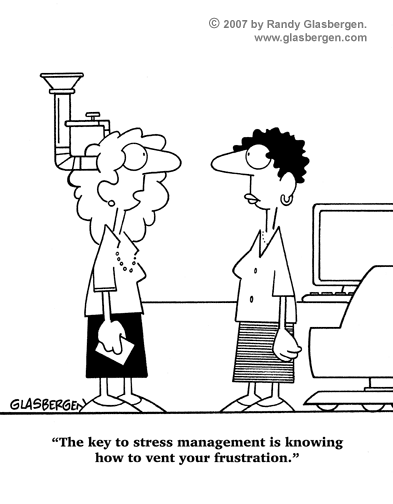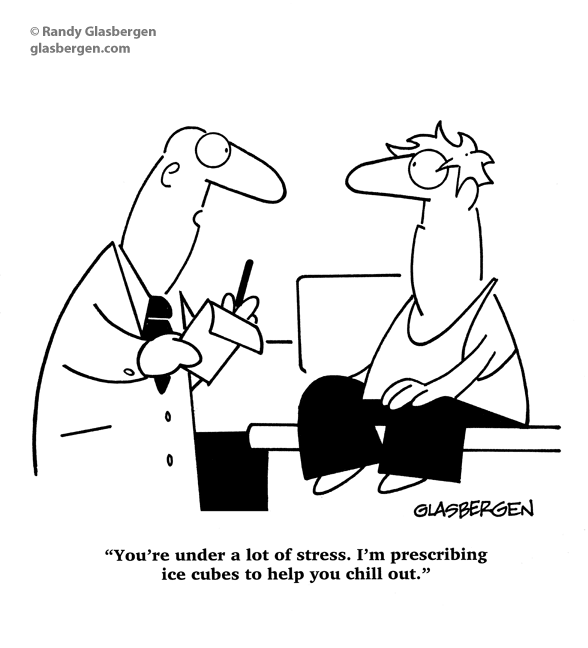
YES, you are stressed…but what are you doing about it?
The bulk
of the tension stems from the feeling that we can never get enough done, and
that office demands are draining us of energy we’d rather save for family and
relationships – Carol Kauffman, PhD, Assistant Clinical Professor of Psychology
at Harvard Medical School.
Carving out just minutes a day for a few
simple, soothing activities can make all the difference between getting crazed
and staying calm. These 13 tips will
help you to fend off that frazzled feeling:
1.
Stop using the
“S” word
Stress is a
loaded term where it is automatically being associated with anxiety, tension
and fatique – Scott Shepperd, PhD, author of Who’s in Charge? Attacking
the Stress Myth.
Think of your
work as challenging instead of stressful, then you’ll be able to approach any
situation with a more proactive mind-set.
You’ll be in the position to better able solve the problem.
2.
Ask co-worker
about their weekend
You may get more
done if you don’t squander precious time chatting with colleagues. But avoiding them may actually heighten
anxiety. Studies have shown that people
without supportive friends at work are more likely to have higher blood
pressure.
Spending a few
minutes catching up each morning helps build a relationship that can provide
ongoing support.
3.
Keep track of
success
It easy to
forget how you’ve succeeded in the past when you are struggling to finish a
demanding project – Stacy Shaw Welch, PhD, Director of the Anxiety and Stress
Reduction Center of Seattle.
Save a folder of
notes and emails of appreciation from bosses and co-workers. This records will help motivate you.
4.
Take control
of the email inbox
Emails is one of
the biggest interruptions in our workday – Marsha Egan, author of Making Good Meetings Great.
When people are
distracted, it’s hard to complete any one thing. This can be frustrating and may lead to more
stress. Dedicate a few minutes every
hour or two to shift through your emails.
You’ll get more done when you focus on one project at a time. It will help you to stay calm.
5.
Let the mind
wonder
Prolonged period
of intense concentration can fatigue your brain – Eric Klinger, PhD, Psychology
Professor Emeritus at the University of Minnesota, Morris.
Allow yourself a
couple of minutes to daydream can provide just enough rest to regain focus and
be more creative and productive.
6.
Linger at
lunch
When you are
stressed out, the body divert its resources to release hormones that help you
cope, decreasing the hormones associated with digestion – Ashley Koff, R.D., a
Los Angeles dietitian.
So eating while
under duress, you’ll likely experience indigestion or bloating. Take half an hour break; turn off your email
and concentrate on eating your food.
7.
Scent your
desk
Adding a
relaxing aroma to your cubicle may boost your concentration – Japanese study. Such aroma will make you better able to focus
and stay mellow when things get tough.
8.
Lend an ear
Trying to solve
other people’s issues puts excess pressure – Kevin Barrows, M.D., director of
mindfulness programs at Osher Center for Integrative Medicine at the University
California, San Francisco.
Listen and
sympathize when someone tries to enlist your help; don’t play Dear Abby.
9.
Take time for
some fresh air
Ringing telephones
and non-stop emails can put people in a state of constant anxiety, which will
elevates levels of stress hormones like cortisol – Jeffrey Brantley, M.D.,
director of Mindfulness-Based Stress Reduction at Duke Integrative Medicine.
Spending time
alone can lower heart rate and blood pressure.
So sneak out for a short lunchtime stroll to clear your head.

10. Get physical everyday
A less-than-hardcore
sweat session still does a body good - Kevin Barrows, M.D., director of
mindfulness programs at Osher Center for Integrative Medicine at the University
California, San Francisco. The perks
comes from the mental time-out and the physiological changes of exercise,
including greater levels of mood-lifting endorphins.
11. Bring hobbies to work
Studies shows
that people who pursue a passion feel less anxiety and depression, and enjoy
more positive moods. Working on hobbies
puts people in a zone, allowing them to forget about other stressors - Carol Kauffman,
PhD, Assistant Clinical Professor of Psychology at Harvard Medical School.
12. Tack much needed extra time onto projects
When your day is
packed with back-to-back meetings, planning on activity takes about 20% longer –
Linda Sapadin, PhD, a Psychologist in Valley Stream, New York.
Factor an extra
half an hour for every 2 hours task will help alleviates panic.
13. Hit the hay earlier
Not having the enough
energy to make it through the day can become the source of stress - Carol Kauffman,
PhD, Assistant Clinical Professor of Psychology at Harvard Medical School.
Aim to get at
least 7 hours of sleep a night.
Shared
from article:
Shape Your Life
Shape, November 2007

No comments:
Post a Comment